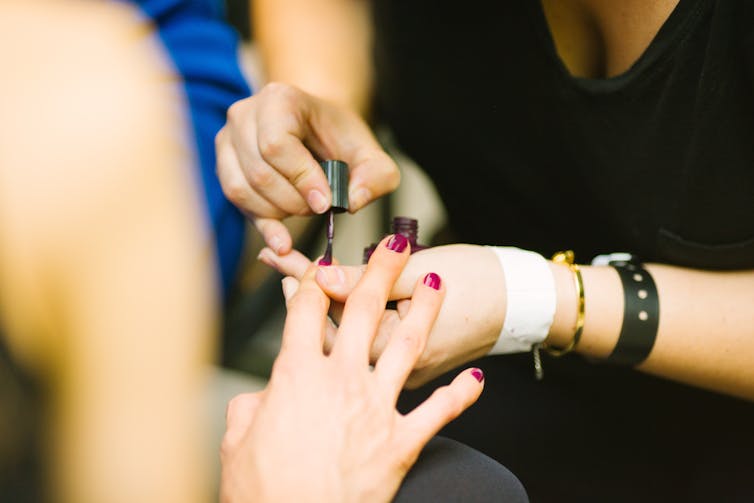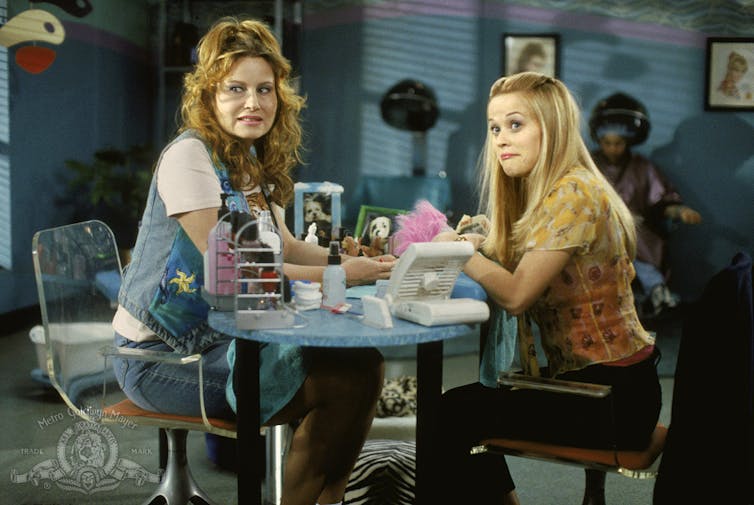More than skin deep, beauty salons are places of sharing and caring
- Written by Hannah McCann, Lecturer in Cultural Studies, University of Melbourne
What happens when people visit beauty salons for skin treatment and hair salons for styling? Are trips to the salon simply about shaping how one looks on the outside, or can these spaces involve something deeper?
Research shows that beyond “beauty”, salons can be spaces for clients to have intimate conversations with salon workers.
This means beyond technical hair and beauty skills, working in the industry involves listening to and managing the emotions of clients.
In my research and interviews with salon workers between 2017 and 2019, most described themselves as makeshift counsellors. One sign in a Melbourne shopfront even read
Therapy is expensive, get a haircut instead, we’re great listeners.
Beyond the technical
Research conducted in the United States shows salon workers can act as “lay health educators”. Workers have close physical contact with clients and potentially access to different and diverse communities, depending on the salon.
Some US salon workers have even been engaged to assist public health campaigns, educating the general public about health issues such as melanoma, diabetes, and unintended pregnancy.
Salon workers can develop a “commercial friendship” with clients as they maintain close physical proximity with the client over a long period. But they are neutral figures in relation to emotional disclosures.
This relationship means clients may disclose more details about the troubles in their lives than they would to friends or family. UK research also shows salons are spaces where workers often provide clients with emotional support.
It’s appropriate then that initiatives have emerged across the globe to train hairdressers and other salon workers to respond to client disclosures.
In Victoria the Eastern Domestic Violence Service has been running a program called Hair-3R’s (recognise, respond and refer), to train salon workers to safely manage client disclosures of family violence.
In some US states, “cosmetologists” (hairstylists, manicurists and other salon workers) are legally required to do formal training in domestic violence and sexual assault awareness every two years to renew their salon licenses.

Though they are likely to hear distressing client disclosures, salon workers are not often trained how to cope or respond. Unsplash, CC BY
What workers signed up for?
Expecting salon workers to respond to issues such as family violence is asking a lot. Low wages and sometimes dangerous working conditions persist in the beauty industry.
When I interviewed salon workers trained in the Hair-3R’s program, I found they were relieved to be able to have frank discussions about the nature of their work, and grateful to receive support and guidance in negotiating these issues.
Research has shown salon workers are likely to have clients disclose intimate partner violence to them at some point. But workers I spoke with also mentioned a huge array of different issues clients bring up.
Marriage breakdown, mental health, suicidal ideation, gender transition and job loss were among the client issues reported by workers.
While the majority of conversations a worker has in a day or even over the course of a week may not be so “heavy”, they will likely encounter diverse and sometimes distressing stories, given the huge segment of the community they come into contact with over months and years. Many workers suggested the Hair-3Rs training was the first time they’d spoken about the emotional aspects of their work or had it recognised as something they negotiate daily.
Beyond the surface
Feminists writing about beauty have long focused on the gender expectations maintained in these spaces. From this perspective, salons have been seen as reinforcing stereotypes of how women should look and how they should maintain their bodies.
A reframing of this perspective notes the beauty industry is highly feminised, dominated by workers who are working class and often migrant women. Salon workers are represented as low-skilled “bimbos” in popular culture and the media. It is therefore no surprise the emotional nature of this line of work has remained largely hidden and both economically and culturally undervalued.

In Legally Blonde (2001) the salon relationship extends beyond grooming. IMDB
As the beauty industry continues to boom – a day spa, nail salon or laser hair removal clinic on almost every Australian street corner and dotted throughout our shopping centres – we might speculate people are accessing these services for reasons beyond maintaining appearances.
While some may lay the blame on an increasingly image-soaked world due to the popularity of social media such as Instagram, we might also look to what kind of emotional refuge the salon is providing for a world in crisis.
Further research is needed to identify what can be done to support workers in this industry, who may accidentally find themselves acting as untrained social workers or therapists with little community support or recognition.
Authors: Hannah McCann, Lecturer in Cultural Studies, University of Melbourne
Read more http://theconversation.com/more-than-skin-deep-beauty-salons-are-places-of-sharing-and-caring-127006




